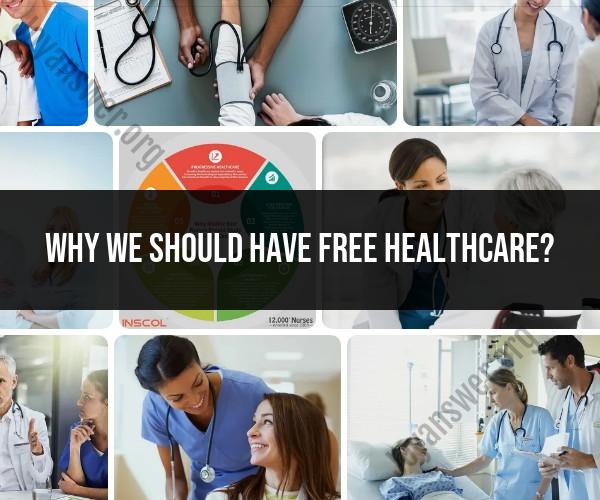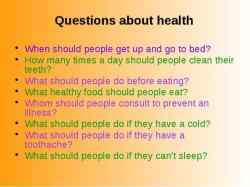Why we should have free healthcare?
The case for free healthcare, often referred to as universal healthcare or a single-payer system, is based on several benefits and considerations. While the specific implementation may vary from one country to another, the core idea is to provide access to healthcare services for all citizens without financial barriers. Here are some reasons why people advocate for free healthcare:
Equal Access to Healthcare: Universal healthcare ensures that every citizen has access to essential healthcare services regardless of their income, employment, or socioeconomic status. It promotes equity in healthcare access, reducing disparities in health outcomes.
Improved Public Health: When healthcare is accessible to all, preventive care and early interventions become more common. This can lead to better public health outcomes, reduced disease transmission, and lower healthcare costs in the long run.
Financial Protection: Free healthcare helps protect individuals and families from catastrophic medical expenses. It eliminates the burden of high medical bills, which can lead to bankruptcy or financial hardship in many countries without universal healthcare.
Cost Control: Single-payer or government-funded systems often have lower administrative costs compared to private insurance systems. They can negotiate lower drug prices, reduce overhead, and allocate resources more efficiently, potentially controlling overall healthcare costs.
Simplicity and Efficiency: A single-payer system streamlines healthcare administration, reducing paperwork for healthcare providers and insurance companies. This can lead to increased efficiency and less bureaucracy.
Choice of Providers: Advocates argue that free healthcare doesn't necessarily restrict choice. Citizens can still choose their healthcare providers, including doctors and hospitals, while the government covers the costs.
Focus on Preventive Care: Free healthcare systems often emphasize preventive care, screenings, and vaccinations. This can lead to early detection and treatment of illnesses, reducing the overall cost of care.
Economic Benefits: A healthier population can contribute to economic productivity. People are more likely to work and be productive when they are healthy and have access to medical care.
Global Competitiveness: Countries with universal healthcare may have a competitive advantage in attracting businesses and a skilled workforce, as potential employees are not as concerned about healthcare costs.
Quality of Life: Improved access to healthcare can enhance the overall quality of life for citizens. It reduces stress related to healthcare expenses and ensures timely medical attention when needed.
However, it's essential to recognize that implementing a free healthcare system also involves challenges and considerations:
Cost: Funding free healthcare requires a substantial financial commitment from the government, which can strain public budgets. Financing mechanisms, such as taxes or premiums, need to be carefully planned.
Resource Allocation: Governments must manage healthcare resources effectively to ensure that all citizens receive timely care. This may involve setting priorities and making difficult decisions.
Wait Times: Some countries with free healthcare experience longer wait times for certain medical procedures or specialist consultations. Balancing access with timely care is a challenge.
Quality Assurance: Maintaining high-quality healthcare services is crucial. Governments must invest in healthcare infrastructure, workforce training, and quality assurance measures.
Political and Ideological Differences: The debate over free healthcare often involves political and ideological disagreements about the role of government in healthcare and the balance between public and private sector involvement.
Transition Challenges: Transitioning to a free healthcare system from an existing healthcare framework can be complex and may face resistance from vested interests.
Ultimately, the case for free healthcare rests on the belief that healthcare is a fundamental human right and that a well-designed system can benefit both individuals and society as a whole. Different countries have adopted various models of universal healthcare, each with its strengths and weaknesses, reflecting the unique needs and priorities of their populations. The decision to implement free healthcare is a complex one that requires careful planning, consideration of costs, and a commitment to delivering quality care to all citizens.
The Case for Free Healthcare: Arguments and Benefits
There are a number of arguments for and against free healthcare. Some of the main arguments in favor of free healthcare include:
- Improved health outcomes: Studies have shown that countries with universal healthcare have better health outcomes than countries without it. This is likely due to the fact that everyone has access to healthcare, regardless of their income or employment status.
- Reduced financial burden: Free healthcare would eliminate the financial burden of healthcare costs for individuals and families. This would free up money that could be spent on other things, such as housing, food, and education.
- Increased economic productivity: A healthy population is more productive. Free healthcare would help to ensure that everyone is healthy and able to contribute to the economy.
- Social justice: Free healthcare would ensure that everyone has access to the healthcare they need, regardless of their social or economic status. This would promote equality and social justice.
Universal Healthcare: Why Should It Be Free?
There are a number of reasons why universal healthcare should be free. First, healthcare is a basic human right. Everyone deserves to have access to the healthcare they need, regardless of their income or employment status. Second, free healthcare would be more efficient and cost-effective than the current system. The current system is fragmented and inefficient, and it results in a lot of waste. Free healthcare would streamline the system and eliminate waste. Third, free healthcare would be more fair and equitable than the current system. The current system favors the wealthy and the healthy, while it disadvantages the poor and the sick. Free healthcare would ensure that everyone has access to the healthcare they need, regardless of their circumstances.
Examining the Advantages of a Free Healthcare System
There are many advantages to a free healthcare system. One of the biggest advantages is that it would improve the health of the population. When everyone has access to healthcare, they are more likely to get the preventive care they need and to seek treatment for medical problems early on. This can lead to better health outcomes and a longer life expectancy.
Another advantage of a free healthcare system is that it would reduce financial stress on individuals and families. Healthcare can be very expensive, especially in the United States. A free healthcare system would eliminate this financial burden and allow people to focus on other things, such as their education, their careers, and their families.
Finally, a free healthcare system would promote social justice. When everyone has equal access to healthcare, it helps to create a more equitable society. This is especially important for vulnerable populations, such as the poor and the elderly.
Overall, a free healthcare system has many advantages. It would improve the health of the population, reduce financial stress, and promote social justice.












